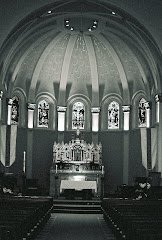Advent 2011 we will begin using the new translation of the Roman Missal. This will include all of the permanent responses and words at Mass called the ‘ordinary’, and it includes all the prayers that change from week to week known as the ‘propers’. Someone asked me: Father, why do we need a new translation. That is an excellent question. Let’s look at some answers.
1. In 2001 the document Liturgiam authenticam was promulgated. This gave new principles for translastion. In the past, they translated very loosely so it was easy to understand. This was not the most accurate translation. The new principles call to translate words and syntax. The goal is now exact and accurate translation.
2. In 2000 the third edition of the Roman Missal was promulgated by Pope John Paul II. This is the Latin version of the mass. With a new addition we need a new translation.
3. The Current translation strays from the original Latin, so it is not accurate. This also means that the English translation does not match the translations of the other languages of the world. As a universal church our translations should agree.
4. The current translation lacks some of the rich language and imagery, especially biblical language. We should recognize the scriptural references.
5. Some of the language is theologically imprecise and can lead people to errors. We want theological precision to avoid any errors.
Liturgy is central to the life of the Church. Through the liturgy we are made present to Christ’s paschal mystery and renews our baptismal commitment to further the saving ministry of Christ. Our worship and prayer will effect we believe and live as Christians. The words of liturgy matter because they express the faith of the people.
The goal of the new translation is to give a deeper sense of the mystery of God’s presence. It will be an excellent opportunity for fuller catechesis on the Mass and Christian living. It will give a more visible unity among all Roman Rite Catholics. And finally, it will be a time to renew our Eucharistic theology, spirituality and practice.
Here is think to the new translation of the Mass:
http://www.usccb.org/romanmissal/order-of-mass.pdf
The Per ipsum
-
Lost in Translation #160After the Per quem haec omnia, the priest concludes
the Canon with: Per ipsum, et cum ipso, et in ipso, est tibi Deo Patri
omnipote...
2 hours ago





Fr. Tom,
ReplyDeleteWill "No 'Yahweh' in songs, prayers at Catholic Masses, Vatican rules," be applied during the new translation in Advent 2011 as well? (see http://www.catholicnews.com/aboutcns.htm)
The reason I ask is that we've recently "used or pronounced [Yahweh] in songs...," during Mass.
Thanks,
John
Greetings,
ReplyDeleteThe rule is out there that we should Not use songs with Yahweh in them. Some times we end up singing Yahweh in a second verse that people did NOT remember being there. Or they pick the song for daily mass forgetting that it is a rule. The problem is that the songs are all still in the hymnal. When we eventually get new hymnals those songs will not be included.
peace
Ah....thank you. That helps.
ReplyDeleteI should add that those songs will still be included in any mainstream Catholic hymnal, but with the lyrics slightly altered and Yahweh replaced with more liturgically correct text. For example, in the popular song "You Are Near", the old lyrics begin "Yahweh, I know You are near...." The revised lyrics (which are in post-2008 hymnals, missalettes, and supplements) are "O Lord, I know You are near..." The new lyrics aren't as poetic as the old (something that I think is very important in song/hymn lyrics), but make the song more permissable.
ReplyDeleteAs Fr. Tom pointed out, the problem is that we are using old books; Gather (green) was published in 1994, and People's Mass Book (brown) is from 1984. They continue to serve our parish well. While I try to avoid songs with Yahweh, they will still inevitably sneak in from time to time. When the time comes for new books, the offending lyrics will have been replaced.